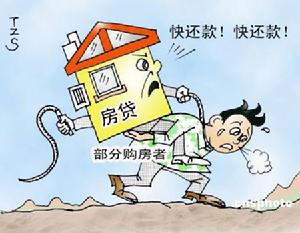“Mortgage slave”的版本间的差异
来自China Digital Space
| 第7行: | 第7行: | ||
In addition to “mortgage slaves,” there are also “[http://money.business.sohu.com/20061012/n245739215_1.shtml card slaves]”, “[http://baike.baidu.com/view/1001625.htm car slaves]”, and “[http://money.business.sohu.com/20061012/n245739215_3.shtml certificate slaves]”. These newly coined words reflect an increasing dependence on credit and loans in the pursuit of property, a lifestyle, and education. | In addition to “mortgage slaves,” there are also “[http://money.business.sohu.com/20061012/n245739215_1.shtml card slaves]”, “[http://baike.baidu.com/view/1001625.htm car slaves]”, and “[http://money.business.sohu.com/20061012/n245739215_3.shtml certificate slaves]”. These newly coined words reflect an increasing dependence on credit and loans in the pursuit of property, a lifestyle, and education. | ||
| − | As China has developed rapidly over the past thirty years, the purchasing power of the average Chinese citizen [http://www.nytimes.com/2009/08/14/business/global/14card.html?pagewanted=all has not kept pace] with the lifestyles depicted in advertisements. Government attempts to stimulate spending in order to grow the economy have also contributed to the problem. | + | As China has developed rapidly over the past thirty years, the purchasing power of the average Chinese citizen [http://www.nytimes.com/2009/08/14/business/global/14card.html?pagewanted=all has not kept pace] with the lifestyles depicted in advertisements for electronics, property, and luxury goods, which represent freedom and success to many consumers. Government attempts to stimulate spending in order to grow the economy have also contributed to the problem. |
[[File:mortgage slave.jpg|500px|thumb|center]] | [[File:mortgage slave.jpg|500px|thumb|center]] | ||
[[Category: Grass-Mud Horse Lexicon]] | [[Category: Grass-Mud Horse Lexicon]] | ||
2013年4月29日 (一) 17:47的版本
房奴 (fáng nú): mortgage slave
A mortgage slave is someone who spends more than 40% of his or her disposable income on a home mortgage. People may become mortgage slaves by purchasing a house with a very low down payment and spending twenty to thirty of their golden years working extremely hard to afford very high monthly mortgage payments.
The word “mortgage slave” was included in a list of new Chinese words by the Ministry of Education in 2007, demonstrating the extent to which high property prices have become a source of pressure and anxiety for China's lower- and middle-class citizens.
In addition to “mortgage slaves,” there are also “card slaves”, “car slaves”, and “certificate slaves”. These newly coined words reflect an increasing dependence on credit and loans in the pursuit of property, a lifestyle, and education.
As China has developed rapidly over the past thirty years, the purchasing power of the average Chinese citizen has not kept pace with the lifestyles depicted in advertisements for electronics, property, and luxury goods, which represent freedom and success to many consumers. Government attempts to stimulate spending in order to grow the economy have also contributed to the problem.





